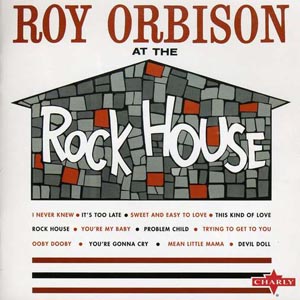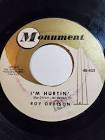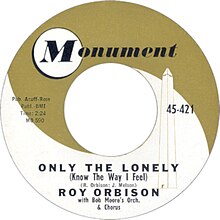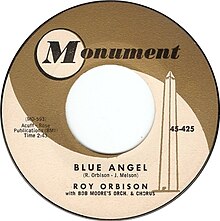
Rock and roll music
From Wikipedia, the free encyclopedia
Leer más
Lonely and Blue
Roy Orbison
Discográfica: Monument · Estudio de grabación: RCA Studio B, Nashville · Productor: Fred Foster
CHARTS
UK
|
1
|
Only the Lonely (Know the Way I Feel)
Roy Orbison •
Roy Orbison •
w: Roy Orbison, Joe Melson •
1961 /01
|
2:26 |
|
|
|
2
|
Bye-Bye Love
Roy Orbison •
Roy Orbison •
w: Felice & Boudleaux Bryant •
1961 /01
|
2:13 |
|
|
|
3
|
Cry
Roy Orbison •
Roy Orbison •
w: Churchill Kohlman •
1961 /01
|
2:42 |
|
|
|
4
|
Blue Avenue
Roy Orbison •
Roy Orbison •
w: Roy Orbison, Joe Melson •
1961 /01
|
2:19 |
|
|
|
5
|
I Can’t Stop Loving You
Roy Orbison •
Roy Orbison •
w: Don Gibson •
1961 /01
|
2:43 |
|
|
|
6
|
Come Back to Me
Roy Orbison •
Roy Orbison •
w: Roy Orbison, Joe Melson •
1961 /01
|
2:27 |
|
|
|
7
|
Blue Angel
Roy Orbison •
Roy Orbison •
w: Orbison, Melson •
1961 /01
|
2:51 |
|
|
|
8
|
Raindrops
Roy Orbison •
Roy Orbison •
w: Joe Melson •
1961 /01
|
1:53 |
|
|
|
9
|
(I’d Be) A Legend in My Time
Roy Orbison •
Roy Orbison •
w: Don Gibson •
1961 /01
|
3:08 |
|
|
|
10
|
I’m Hurtin’
Roy Orbison •
Roy Orbison •
w: Orbison, Melson •
1961 /01
|
2:43 |
|
|
|
11
|
Twenty-Two Days
Roy Orbison •
Roy Orbison •
w: Gene Pitney •
1961 /01
|
3:07 |
|
|
|
12
|
I’ll Say It’s My Fault
Roy Orbison •
Roy Orbison •
w: Roy Orbison, Fred Foster •
1961 /01
|
2:21 |
|
Singles
Im Hurtin
Fecha Lanzamiento: 1960 · Fecha Grabación: 1960 -Discográfica: RCA Victor · Estudio de Grabación: RCA Studio B, Nashville · Productor: Chet Atkins
CHARTS
HOT
CAN
UK
|
1
|
Im Hurtin
Roy Orbison •
Roy Orbison •
w: Orbison, Melson •
1960
|
2:44 |
|
|
|
2
|
I Cant Stop Loving You
Roy Orbison •
Roy Orbison •
w: Don Gibson •
1960
|
2:56 |
|
Only the Lonely (Know the Way I Feel)
Fecha Lanzamiento: 9 Mayo 1960 · Fecha Grabación: 25 Marzo 1960 -Discográfica: Monument 421 · Estudio de Grabación: RCA Victor Studio B, Nashville[2] · Productor: Fred Foster
CHARTS
|
1
|
Only the Lonely (Know the Way I Feel)
Roy Orbison •
Roy Orbison •
w: Roy Orbison, Joe Melson •
1960 /05 /09
|
2:26 |
|
|
|
2
|
Here Comes That Song Again
Roy Orbison •
1960 /05 /09
|
0:00 |
|
Blue Angel
Fecha Lanzamiento: Agosto 1960 · Fecha Grabación: 8 Agosto 1960 -Discográfica: Monument · Estudio de Grabación: RCA Victor Studio B, Nashville, Tennessee · Productor: Fred Foster
CHARTS
HOT
AUS
CAN
UK
|
1
|
Blue Angel
Roy Orbison •
Roy Orbison •
w: Orbison, Melson •
1960 /08
|
2:52 |
|
|
|
2
|
Todays Teardrops
Roy Orbison •
1960 /08
|
0:00 |
|
| Sings Lonely and Blue | ||||
|---|---|---|---|---|
 | ||||
| Studio album by | ||||
| Released | January 1961 | |||
| Recorded | September 18, 1959 – September 17, 1960 | |||
| Studio | RCA Studio B, Nashville | |||
| Genre | Rock | |||
| Length | 28:33 | |||
| Label | Monument | |||
| Producer | Fred Foster | |||
| Roy Orbison chronology | ||||
| ||||
Review
From Wikipedia, the free encyclopedia
Leer más
This article is about the album by Roy Orbison. For the album by Etta Jones, see Lonely and Blue (Etta Jones album).
1961 studio album by Roy Orbison
Lonely and Blue is the debut studio album by Roy Orbison,[1] released on Monument Records in January 1961.[2]
The track entitled "Come Back to Me (My Love)" features an almost identical intro to "Only the Lonely" because this is where the vocal figure of "Only the Lonely" came from.[3]
it entered the UK album chart two years later, on June 30, 1963 and reached number 14 over the course of eight weeks.[4]
The album was released on compact disc for the first time by Monument Records in 1993 as tracks 1 through 12 on a pairing of two albums on one CD with tracks 13 through 24 consisting of being Orbison 2nd Studio Album from January 1962, Crying.[5]
History
After a two-year stint at Sun Records, Roy Orbison signed up with RCA Records in 1958, but left after two singles. In early 1959 Orbison`s manager Wesley Rose asked producer and owner Fred Foster if he was interested in signing him for Monument Records. Foster said yes. The album was recorded at RCA Studio B using two- and three-track tape machines.
Reception
| Review scores | |
|---|---|
| Source | Rating |
| AllMusic | [6] |
| The Encyclopedia of Popular Music | [7] |
Bruce Eder of AllMusic said that the album "packed with great moments and different permutations of that sound: the powerful lead vocal and the Boots Randolph sax break on "I`ll Say It`s My Fault"; the haunting Orbison-Melson "Come Back to Me (My Love)," a vest-pocket romantic melodrama sung with operatic depth and played to a light rock & roll beat; Don Gibson`s "I`d Be a Legend in My Time", and "I Can`t Stop Loving You".[6]
Billboard magazine gave a postive results, described the album as "a Spinnable Album"[8]
Cashbox appreciated the effort. "Good material and a striking delivery add up to strong merchandise."[9]
Track listing
All tracks recorded 15–17 September 1960, except where indicated.
| No. | Title | Writer(s) | Length |
|---|---|---|---|
| 1. | "Only the Lonely" (March 25, 1960) | Roy Orbison, Joe Melson | 2:26 |
| 2. | "Bye Bye Love" | Felice & Boudleaux Bryant | 2:14 |
| 3. | "Cry" | Churchill Kohlman | 2:41 |
| 4. | "Blue Avenue" (March 25, 1960) | Roy Orbison, Joe Melson | 2:20 |
| 5. | "I Can`t Stop Loving You" | Don Gibson | 2:43 |
| 6. | "Come Back to Me (My Love)" | Roy Orbison, Joe Melson | 2:27 |
| No. | Title | Writer(s) | Length |
|---|---|---|---|
| 1. | "Blue Angel" (August 8, 1960) | Roy Orbison, Joe Melson | 2:51 |
| 2. | "Raindrops" (September 18, 1959) | Joe Melson | 1:53 |
| 3. | "(I`d Be) A Legend in My Time" | Don Gibson | 3:08 |
| 4. | "I`m Hurtin`" | Roy Orbison, Joe Melson | 2:43 |
| 5. | "Twenty-Two Days" | Gene Pitney | 3:07 |
| 6. | "I`ll Say It`s My Fault" | Roy Orbison, Fred Foster | 2:21 |
| No. | Title | Writer(s) | Length |
|---|---|---|---|
| 13. | "Up Town" (1959 single) | Orbison, Melson | 2:07 |
| 14. | "Pretty One" (B-side to "Up Town") | Orbison | 2:18 |
| 15. | "Here Comes That Song Again" (B-side to "Only the Lonely") | D. Flood | 2:44 |
| 16. | "Today`s Teardrops" (B-side to "Blue Angel") | Pitney, A. Schroeder | 2:12 |
From Wikipedia, the free encyclopedia
This article is about the album by Roy Orbison. For the album by Etta Jones, see Lonely and Blue (Etta Jones album).
1961 studio album by Roy Orbison
Lonely and Blue is the debut studio album by Roy Orbison,[1] released on Monument Records in January 1961.[2]
The track entitled "Come Back to Me (My Love)" features an almost identical intro to "Only the Lonely" because this is where the vocal figure of "Only the Lonely" came from.[3]
it entered the UK album chart two years later, on June 30, 1963 and reached number 14 over the course of eight weeks.[4]
The album was released on compact disc for the first time by Monument Records in 1993 as tracks 1 through 12 on a pairing of two albums on one CD with tracks 13 through 24 consisting of being Orbison 2nd Studio Album from January 1962, Crying.[5]
History
After a two-year stint at Sun Records, Roy Orbison signed up with RCA Records in 1958, but left after two singles. In early 1959 Orbison`s manager Wesley Rose asked producer and owner Fred Foster if he was interested in signing him for Monument Records. Foster said yes. The album was recorded at RCA Studio B using two- and three-track tape machines.
Reception
| Review scores | |
|---|---|
| Source | Rating |
| AllMusic | [6] |
| The Encyclopedia of Popular Music | [7] |
Bruce Eder of AllMusic said that the album "packed with great moments and different permutations of that sound: the powerful lead vocal and the Boots Randolph sax break on "I`ll Say It`s My Fault"; the haunting Orbison-Melson "Come Back to Me (My Love)," a vest-pocket romantic melodrama sung with operatic depth and played to a light rock & roll beat; Don Gibson`s "I`d Be a Legend in My Time", and "I Can`t Stop Loving You".[6]
Billboard magazine gave a postive results, described the album as "a Spinnable Album"[8]
Cashbox appreciated the effort. "Good material and a striking delivery add up to strong merchandise."[9]
Track listing
All tracks recorded 15–17 September 1960, except where indicated.
| No. | Title | Writer(s) | Length |
|---|---|---|---|
| 1. | "Only the Lonely" (March 25, 1960) | Roy Orbison, Joe Melson | 2:26 |
| 2. | "Bye Bye Love" | Felice & Boudleaux Bryant | 2:14 |
| 3. | "Cry" | Churchill Kohlman | 2:41 |
| 4. | "Blue Avenue" (March 25, 1960) | Roy Orbison, Joe Melson | 2:20 |
| 5. | "I Can`t Stop Loving You" | Don Gibson | 2:43 |
| 6. | "Come Back to Me (My Love)" | Roy Orbison, Joe Melson | 2:27 |
| No. | Title | Writer(s) | Length |
|---|---|---|---|
| 1. | "Blue Angel" (August 8, 1960) | Roy Orbison, Joe Melson | 2:51 |
| 2. | "Raindrops" (September 18, 1959) | Joe Melson | 1:53 |
| 3. | "(I`d Be) A Legend in My Time" | Don Gibson | 3:08 |
| 4. | "I`m Hurtin`" | Roy Orbison, Joe Melson | 2:43 |
| 5. | "Twenty-Two Days" | Gene Pitney | 3:07 |
| 6. | "I`ll Say It`s My Fault" | Roy Orbison, Fred Foster | 2:21 |
| No. | Title | Writer(s) | Length |
|---|---|---|---|
| 13. | "Up Town" (1959 single) | Orbison, Melson | 2:07 |
| 14. | "Pretty One" (B-side to "Up Town") | Orbison | 2:18 |
| 15. | "Here Comes That Song Again" (B-side to "Only the Lonely") | D. Flood | 2:44 |
| 16. | "Today`s Teardrops" (B-side to "Blue Angel") | Pitney, A. Schroeder | 2:12 |
DISCOGRAFÍA
Only the Lonely (Know the Way I Feel) · Channel: Roy Orbison - Topic · 2m 27s


Bye Bye Love · Channel: Roy Orbison - Topic · 2m 14s

Roy Orbison - Crying (Monument Concert 1965) · Channel: RoyOrbisonVEVO · 3m 3s

Blue Avenue · Channel: Roy Orbison - Topic · 2m 20s

Roy Orbison - I Can't Stop Loving You · Channel: Mohammad Maminteng · 2m 49s
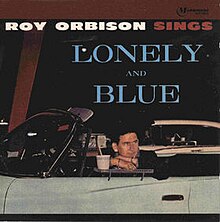
Roy Orbison-.....Come Back To Me · Channel: barrygioportmorien1 · 2m 27s

Blue Angel · Channel: Roy Orbison - Topic · 2m 52s

Raindrops · Channel: Roy Orbison - Topic · 1m 53s
![[I'd Be] A Legend in My Time [I'd Be] A Legend in My Time](https://img.youtube.com/vi/ARC95LhXSzQ/sddefault.jpg)
[I'd Be] A Legend in My Time · Channel: Roy Orbison - Topic · 3m 8s

I'm Hurtin' · Channel: Roy Orbison - Topic · 2m 43s

Twenty-Two Days · Channel: Roy Orbison - Topic · 3m 7s





